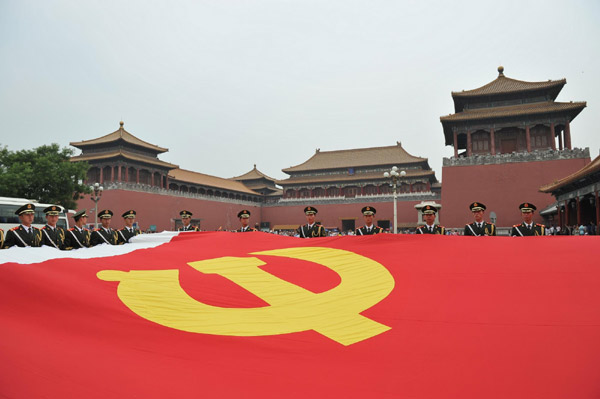The CPC: 90 years of success
- By Rashid Ahmad Khan
 0 Comment(s)
0 Comment(s) Print
Print E-mail
China.org.cn, June 30, 2011
E-mail
China.org.cn, June 30, 2011
|
|
|
The national flag guards at Tian'anmen Square show a huge flag of the Communist Party of China (CPC) at the Meridian Gate (Wu Men) square inside the Forbidden City in Beijing. [Photo/Xinhua] |
The Communist Party of China was founded on July 1, 1921. When it held its First Congress 22 days later, there were 13 delegates. Today its membership is about 80 million, with a basic party organization in cities, towns, villages, neighborhoods, major workplaces, schools and many other places.
In the last 90 years, it has lifted the Chinese people from the mires of misery, poverty and hunger to unprecedented heights of development, progress and prosperity, turning China into an envy of the world. By successfully managing food, energy, education, housing and health and other basic requirements of 1.3 billion people – one-fifth of humanity – the CPC has not only brought about a revolutionary change in the lives of the Chinese people, it has made a singular contribution to the maintenance of the stability of global order.
Under the leadership of the CPC, China has achieved phenomenal economic development. Its economy is now the second-largest in the world and is estimated to surpass the United States as the largest by 2035. In leading the People's Republic of China, it has overcome every challenge it faced: attempts to encircle China during the Cold War, war with Vietnam, self-sufficiency in food security and the recent financial crisis. The credit of all these and other achievements goes to the CPC, whose leadership showed remarkable wisdom and pragmatism in adjusting party line and strategy.
From the very beginning, the CPC correctly understood the objective and subjective conditions for a revolutionary change in China, focusing on rural areas to build its base. It still retains its focus on rural areas as agriculture enjoys priority among the Four Modernizations. The CPC earned respect and support because it rendered great sacrifices – the Long March, for example – during the struggle to free China from foreign rule and domestic feudalism. An important factor in the CPC's continued support is that it recognizes its mistakes, such as with the Great Leap Forward and the Cultural Revolution, and makes timely corrections. It opened up its economy and introduced economic reforms without repeating the mistakes of the former Soviet Union and still retaining a socialist framework.
China's economic development is still uneven across regions. While the CPC has focused mostly on the eastern and central parts of the country, it has recently begun to undertake massive development plans in the West. The CPC also faces other challenges, such as growing income inequality, environmental degradation, pollution, water shortages, an aging population and the rising costs of education and housing. But the CPC is well aware of these challenges and have enacted policies to develop infrastructure, conserve water and rural reforms.
Dr. Khan is a professor and chairman of the Department of International Relations/Political Science at the University of Sargodha in Pakistan.
Opinion articles reflect the views of their authors, not necessarily those of China.org.cn.






